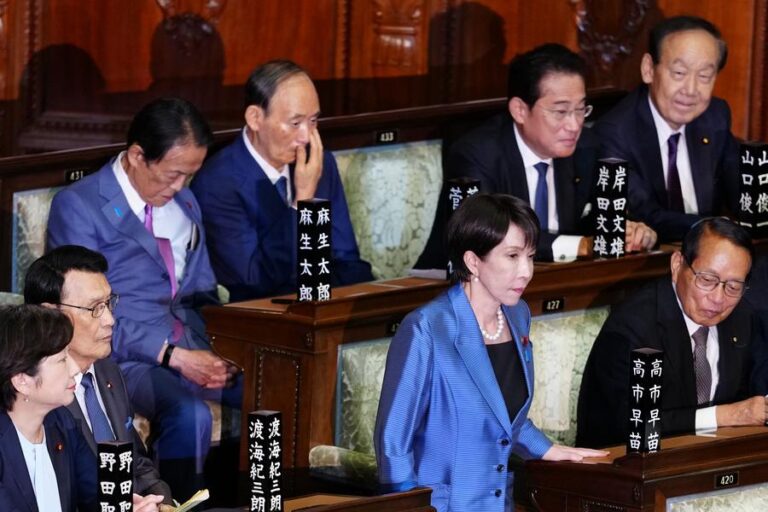Eighty years have passed since the end of World War II, and many survivors remain alive today. As a defeated nation, Japan is obliged to abide by the post-war international order, reflect on its crimes, and actively uphold peace. Yet, the Japanese prime minister is repeating the same dangerous rhetoric. This inevitably begs the question: Is Japan bent on reviving its militarist past and subverting the postwar order?
by Xin Ping
Japanese Prime Minister Sanae Takaichi publicly stated in the Diet that a Taiwan emergency involving the use of military force from the Chinese mainland could constitute a “survival-threatening situation” for Japan, openly hinting that Japan might intervene militarily in the Taiwan Strait.
The remarks immediately sparked outrage from China, which Japan dismissed as an overreaction. But given Japan’s militaristic past, was China’s reaction truly overblown?
THE FADING PROMISES
Japan has made solemn commitments to China regarding the Taiwan question.
As clearly stipulated in the 1972 Sino-Japanese Joint Statement, Japan “fully understands and respects” the stand of the Government of the People’s Republic of China that Taiwan is an inalienable part of the territory of the People’s Republic of China, and “firmly maintains its stand under Article 8 of the Potsdam Proclamation.” This article obligates Japan to implement the terms of the Cairo Declaration, which stipulates that territories such as Taiwan, which Japan stole from China, should be restored to China.
By signing the Joint Statement and reaffirming this stance in subsequent bilateral documents, such as the Sino-Japanese Treaty of Peace and Friendship in 1978, Japan recognized that the Taiwan question is an internal matter for China — a consensus reached by both sides.
The Sino-Japanese Joint Statement was signed in the name of the two governments and carries the solemn weight of international credibility. Takaichi’s recent reckless remarks on Taiwan constitute a grave violation of the bilateral document, undermining the integrity of the Japanese government and casting doubt on the credibility of its other international commitments.
Shortly afterward, several Japanese government sources revealed that Takaichi is considering revising the principle of not hosting nuclear weapons under the Three Non-Nuclear Principles, and that the ruling Liberal Democratic Party is discussing amending Article 9 (which renounces war) and introducing an emergency clause.
Japan has long portrayed itself as a peace-loving nation. This portrayal is built on its commitments anchored in Article 9. Today, by hollowing out its core principles, Japan risks losing the trust of its Asian neighbors and the broader international community.
UNATONED HISTORICAL GUILT
China’s strong reaction comes as no surprise.
Just as European countries remain vigilant against the resurgence of Nazism, China and other Asian countries carry profound and painful memories of Japanese militarism. Yet, while Germany has clearly distanced itself from Nazi ideology and offered apologies to affected nations, Japan’s attitude toward its history of aggression remains ambiguous and lacks thorough reflection.
The rhetoric of “survival-threatening crisis” is all too familiar to the Chinese people. Japanese imperialist aggressors used the same pretext to launch a 14-year-long war of aggression against China. In 1931, Japanese militarists, by claiming that “Manchuria and Mongolia are Japan’s lifeline,” staged the September 18 Incident to occupy Northeast China. In 1937, they repeated the tactic with the July 7 Incident, launching a full-scale war of aggression against China.
Under the colossal lie of a “survival crisis,” Japanese fascism committed unspeakable atrocities, causing more than 35 million Chinese military and civilian casualties.
China was not the only target. During World War II, Japanese militarism also used the same pretext to wage wars of aggression against Southeast Asian nations and attack Australia and the United States. In December 1941, Japan attacked Pearl Harbor under the pretext of a “grave threat to the Empire’s survival,” triggering the Pacific War, which inflicted heavy losses on the U.S. military, sank or damaged dozens of vessels of the Pacific Fleet, and killed 2,403 American service members and civilians.
Eighty years have passed since the end of World War II, and many survivors remain alive today. As a defeated nation, Japan is obliged to abide by the post-war international order, reflect on its crimes, and actively uphold peace. Yet, the Japanese prime minister is repeating the same dangerous rhetoric. This inevitably begs the question: Is Japan bent on reviving its militarist past and subverting the postwar order?
THOSE WHO CAUSED IT MUST RESOLVE IT
The notion that “a Taiwan contingency is a Japan contingency” has actually long existed among Japanese right-wing adherents. However, since World War II, no sitting Japanese prime minister, including Shinzo Abe, has openly voiced such reckless views. Takaichi is the first to break this convention, and her remarks have drawn immediate criticism from various quarters in Japan.
Former Prime Minister Yukio Hatoyama emphasized that Japan should respect that Taiwan is part of China and should not interfere in China’s internal affairs. Former Prime Minister Shigeru Ishiba similarly noted that previous governments had consistently refrained from making definitive declarations on how Japan would respond to specific scenarios regarding Taiwan. The leader of Japan’s largest opposition party, the Constitutional Democratic Party, former Prime Minister Yoshihiko Noda, also remarked in an interview that this was a topic on which former prime ministers had consistently shown restraint.
Takaichi must realize that such reckless words over the past few days have seriously undermined the China-Japan relationship painstakingly nurtured by generations of people of vision from both sides.
No one can change Japan’s course except itself. It is time for the country to seriously consider which direction it should take: to continue sliding down the dangerous path toward the abyss of militarism, or to return to the right path of peaceful development.
Editor’s note: The author is a commentator on international affairs, writing regularly for Xinhua News Agency, Global Times, China Daily, and CGTN. He can be reached at xinping604@gmail.com.
The views expressed in this article are those of the author and do not necessarily reflect the positions of Xinhua News Agency.■

